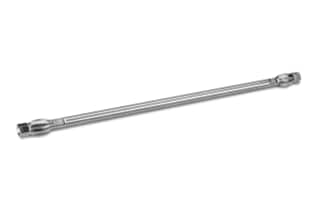
|
Chemistry |
Phenyl |
|
Separation Mode |
Reversed Phase |
|
Particle Substrate |
Hybrid |
|
pH Range Min |
1 pH |
|
pH Range Max |
12 pH |
|
Maximum Pressure |
6000 psi (415 Bar) |
|
Endcapped |
Yes |
|
Bonding Technology |
2-methyl-2-phenylethyl |
|
Silanol Activity |
Low |
|
Particle Shape |
Spherical |
|
Particle Size |
3.5 µm |
|
Endfitting Type |
Waters |
|
Pore Size |
125 Å |
|
Format |
Column |
|
Surface Area |
175 |
|
System |
HPLC |
|
USP Classification |
L11 |
|
Inner Diameter |
4.6 mm |
|
Length |
250 mm |
|
Carbon Load |
12 % |
|
UNSPSC |
41115709 |
|
Brand |
XTerra |
|
Product Type |
Columns |
|
Units per Package |
1 pk |

XTerra 2-methyl-2-phenylethyl Column, 125Å, 3.5 µm, 4.6 mm X 250 mm, 1/pk
The XTerra phenyl columns are designed to offer chromatographers complementary selectivity in contrast to other straight-chain alkyl phases. This is especially true for compounds that contain aromatic rings. The combination of Hybrid Particle Technology and the XTerra phenyl chemistry yields a high pH stability stationary phase that has an excellent peak shape for all compounds and highly reproducible retention times. You can benefit from the unique combination and these exceptional qualities by adding the XTerra 2-methyl-2-phenylethyl Column to your lab.
The XTerra 2-methyl-2-phenylethyl Column composition also consists of difunctional bonding chemistry of the short-chain phenyl ligand that imparts improved low pH hydrolytic stability. With the very unique combination of substrate and ligands, the XTerra 2-methyl-2-phenylethyl Column adds a new dimension in selectivity for separations of complex mixtures.
You can shop for your needs and lab equipment and check all related products and other variants of the same listing as well as our complete range of products to see our latest offerings in our catalog.
The manufacture of XTerra 2-methyl-2-phenylethyl Column starts with ultrapure reagents to control the chemical composition and purity of the Hybrid particle. Every manufacturing step is conducted within narrow tolerances, under the strictest conditions and monitoring, and each column is individually tested. Certificates of Batch Analysis and Column Efficiency are provided with each column. The packing materials are synthesized using Waters Hybrid Particle Technology. The XTerra particles contain both inorganic (silica) and organic (organosiloxane) components, combining the advantages of both for high efficiency of separation and improved pH stability.
You may also be interested in the XTerra 2-methyl-2-phenylethyl VanGuard Cartridge, 125Å, 3.5 µm, 3.9 mm X 5 mm, 3/pk, which is recommended by Waters for use with the analytical XTerra Column as is designed to protect the XTerra 2-methyl-2-phenylethyl Column while enhancing its lifetime and performance by removing contaminants from the mobile phase stream.
What Is The pH Range Of The XTerra 2-methyl-2-phenylethyl Column?
The XTerra brand has multiple variations. However, the variations offer distinct advantages over their silica counterparts in terms of the wide-scale pH range. The MS columns offer stable chemical analysis between pH range (1-12) while the RP columns’ pH range is 2-12. The XTerra 2-methyl-2phenylethyl Column has an operating pH range of 1-12. Even though the columns are designed to have greater lifespans, they are still finite and buffers will be a determining factor in the lifetimes.